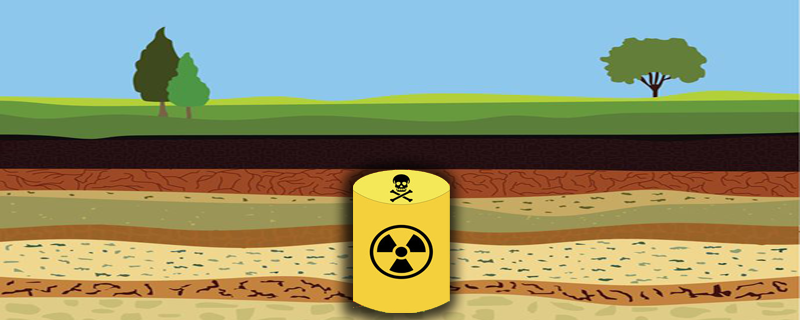China is building a massive underground laboratory to research disposal technologies for high-level radioactive waste, the most dangerous by-product of nuclear technology and applications. This is meant to pave the way for a repository that can handle the disposal of at least a century’s worth of such materials for tens of thousands of years.
The lab will be situated in granite up to 560 meters below ground in the Beishan region of Gansu province, said Wang Ju, vice president of the Beijing Research Institute of Uranium Geology. The underground lab was listed as one of China’s major scientific construction projects in the 13th Five-Year Plan (2016-20).
Its surface facilities will cover 247 hectares, with 2.39 hectares of gross floor space. The underground complex will have a total structural volume of 514,200 square cubic meters, along with 13.4 kilometers of tunnels, he added.
The lab is estimated to cost over 2.72 billion yuan (£305 million) and take seven years to build. It is designed to operate for 50 years, and if its research proves successful and the site is suitable, a long-term underground repository for high-level waste will be built near the lab by 2050.
Workers began building a water distribution system for the lab on December 28th, and roads to it are set to be paved this year, Wang added. “The lab will provide critical support in the safe geological disposal of high-level waste, which is crucial for the sustainable development of nuclear energy in China.”
In 1985, the same year that China started building its first nuclear reactor, Chinese scientists had already begun researching how to properly dispose of such waste, which includes harmful substances such as strontium-90, cesium-137 and plutonium-239. All three substances are very damaging to animal cells and the environment.
High-level waste management constitutes the end stage of the nuclear fuel cycle, and it is a major challenge for all nuclear countries, as these highly irradiated by-products make up only about 3% of the total volume of nuclear waste, yet can contribute over 95% of the waste’s total radioactivity, according to the World Nuclear Association.
“As China bolsters its nuclear power capacity, the disposal of high-level waste becomes a critical issue for nuclear safety and environmental protection,” Wang said.
According to the 14th Five-Year Plan (2021-25), China seeks to cut carbon emissions by optimizing its energy consumption structure and raising its proportion of non-fossil energy to around 20% in the next few years. Nuclear energy currently makes up about 5% of the total energy China produces.
This includes building a new generation of coastal nuclear plants and expanding the nation’s solar energy generating capacity from about 50 giga watts last year to 70 giga watts by 2025. China will also bolster its ability to process nuclear waste, along with promoting technologies including modular small-scale reactors and offshore floating reactors, the plan said.
As of last year, China had 49 nuclear reactors in operation, making it the world’s third-largest nuclear energy producer, behind the United States and France. There are 16 nuclear reactors in construction in China, the most in the world, according to the World Nuclear Association.
“We cannot just reap the benefits of nuclear energy and worry about cleaning up its waste later. Development and safety are equally important, and both have always been the two paramount priorities in China’s nuclear energy strategy,” Wang said.
At the advent of nuclear technologies, humanity’s disposal of nuclear waste was littered with controversial ideas and short-sighted practices, from early nuclear nations dumping it into the oceans to some scientists proposing launching it into space.
Infamous incident
One of the most infamous incidents came in July 1957, when the U.S. Navy was dumping waste into the sea. Two barrels of radioactive sodium kept floating back to the surface, prompting the Navy to send aircraft to shoot the barrels with machine guns until they sank, The New York Times reported.
The international scientific community eventually agreed that a safe and feasible method to dispose of waste is to permanently bury it deep underground in a tomb of concrete and rock, isolated from all biospheres, natural disasters and human activities for millennia, according to the International Atomic Energy Agency.
But this requires scientists to comprehensively survey the repository’s environment, both on the surface and underground, this includes investigating the site’s geological conditions, distribution and flow of groundwater, the types, locations and chemistry of rock types and dozens of other factors.
The repository must also be far from populated areas and historical or cultural sites, as well as ecological protection zones, yet it also needs access to infrastructure so that personnel and material can be moved in to build the project.
Wang continued, “Searching for candidate sites alone is already a massive scientific undertaking, let alone building the underground repository, Sweden, France and Finland have also completed their site selection and are applying for or building repositories for high-level waste.
As for China, it took hundreds of scientists and engineers 35 years of drilling boreholes in isolated areas across the country in order to finally decide on the candidate site for the lab in Gansu province.
Fruitful exchanges and long-term collaboration between the International Atomic Energy Agency and the China Atomic Energy Authority played a constructive role in China’s geological disposal of nuclear waste.
I was a young man when I joined the project in 1993. Now people jokingly call me Uncle Wang.
Generations of scientists and engineers have been willing to toil and moil in the desert for this project because everyone knows managing nuclear waste is a solemn undertaking that will have a profound effect on people’s lives, the environment and the nation’s development,
Although living conditions in the field are extremely harsh, we always raise a clean Chinese national flag at our camp to remind ourselves that all the hardship we endure is for the betterment of our country and its people.”
Source: The Japan News





Leave a Reply
Want to join the discussion?Feel free to contribute!